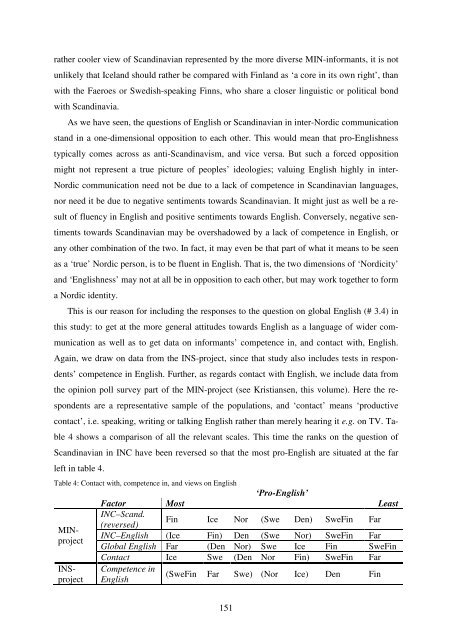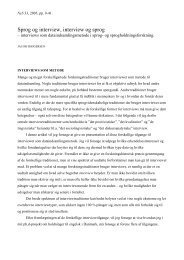Hør dog hvad de siger - Note-to-Self: Trials & Errors
Hør dog hvad de siger - Note-to-Self: Trials & Errors
Hør dog hvad de siger - Note-to-Self: Trials & Errors
Create successful ePaper yourself
Turn your PDF publications into a flip-book with our unique Google optimized e-Paper software.
ather cooler view of Scandinavian represented by the more diverse MIN-informants, it is not<br />
unlikely that Iceland should rather be compared with Finland as ‘a core in its own right’, than<br />
with the Faeroes or Swedish-speaking Finns, who share a closer linguistic or political bond<br />
with Scandinavia.<br />
As we have seen, the questions of English or Scandinavian in inter-Nordic communication<br />
stand in a one-dimensional opposition <strong>to</strong> each other. This would mean that pro-Englishness<br />
typically comes across as anti-Scandinavism, and vice versa. But such a forced opposition<br />
might not represent a true picture of peoples’ i<strong>de</strong>ologies; valuing English highly in inter-<br />
Nordic communication need not be due <strong>to</strong> a lack of competence in Scandinavian languages,<br />
nor need it be due <strong>to</strong> negative sentiments <strong>to</strong>wards Scandinavian. It might just as well be a re-<br />
sult of fluency in English and positive sentiments <strong>to</strong>wards English. Conversely, negative sen-<br />
timents <strong>to</strong>wards Scandinavian may be overshadowed by a lack of competence in English, or<br />
any other combination of the two. In fact, it may even be that part of what it means <strong>to</strong> be seen<br />
as a ‘true’ Nordic person, is <strong>to</strong> be fluent in English. That is, the two dimensions of ‘Nordicity’<br />
and ‘Englishness’ may not at all be in opposition <strong>to</strong> each other, but may work <strong>to</strong>gether <strong>to</strong> form<br />
a Nordic i<strong>de</strong>ntity.<br />
This is our reason for including the responses <strong>to</strong> the question on global English (# 3.4) in<br />
this study: <strong>to</strong> get at the more general attitu<strong>de</strong>s <strong>to</strong>wards English as a language of wi<strong>de</strong>r com-<br />
munication as well as <strong>to</strong> get data on informants’ competence in, and contact with, English.<br />
Again, we draw on data from the INS-project, since that study also inclu<strong>de</strong>s tests in respon-<br />
<strong>de</strong>nts’ competence in English. Further, as regards contact with English, we inclu<strong>de</strong> data from<br />
the opinion poll survey part of the MIN-project (see Kristiansen, this volume). Here the re-<br />
spon<strong>de</strong>nts are a representative sample of the populations, and ‘contact’ means ‘productive<br />
contact’, i.e. speaking, writing or talking English rather than merely hearing it e.g. on TV. Ta-<br />
ble 4 shows a comparison of all the relevant scales. This time the ranks on the question of<br />
Scandinavian in INC have been reversed so that the most pro-English are situated at the far<br />
left in table 4.<br />
Table 4: Contact with, competence in, and views on English<br />
MINproject <br />
INSproject<br />
‘Pro-English’<br />
Fac<strong>to</strong>r Most Least<br />
INC–Scand.<br />
(reversed)<br />
Fin Ice Nor (Swe Den) SweFin Far<br />
INC–English (Ice Fin) Den (Swe Nor) SweFin Far<br />
Global English Far (Den Nor) Swe Ice Fin SweFin<br />
Contact Ice Swe (Den Nor Fin) SweFin Far<br />
Competence in<br />
English<br />
(SweFin Far Swe) (Nor Ice) Den Fin<br />
151



